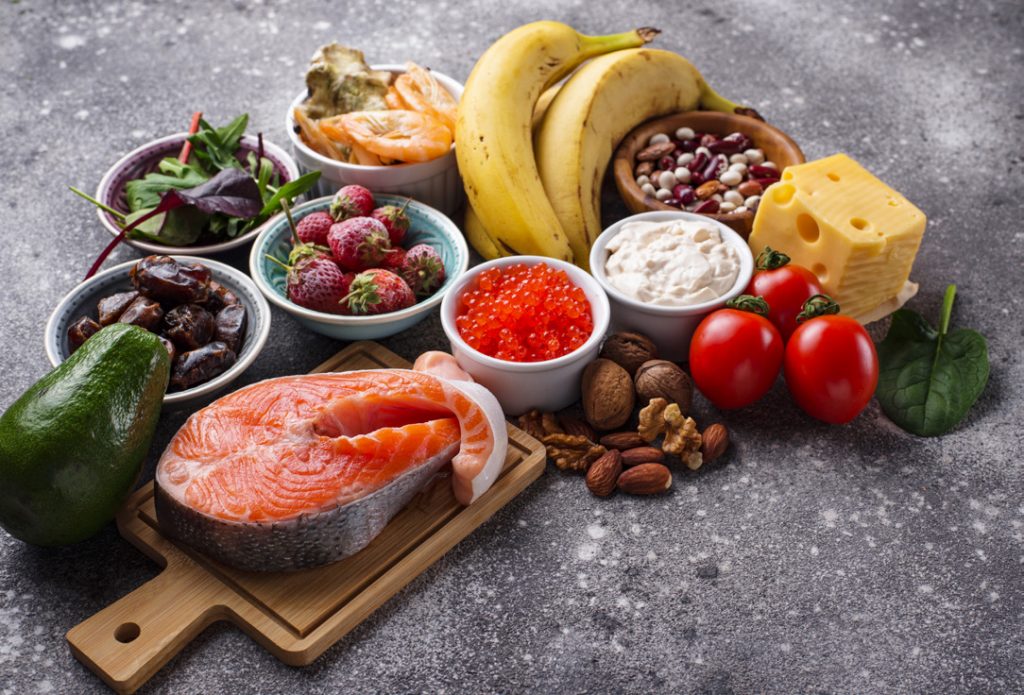Good Food for Great Mood
Nutritional Psychiatry and Wellness

By Anna I. Guerdjikova, PhD, LISW, CCRC
Director of Administrative Services, Harold C. Schott Foundation Eating Disorders Program
The connection between health in general and the foods we consume has been known since the dawn of human kind, and Hippocrates is credited with the “Let food be thy medicine” saying. The narrower connection between overall diet quality and common mental disorders, in particular depression and anxiety, is a much newer field and the term “nutritional psychiatry” was not coined until the most recent decade. Initially, the focus of this discipline was on researching single foods or nutrients and their role in mental health. Gradually, it has been recognized that proper nutrition for good mental health is a very complex landscape. What we consume and how it affects us cannot be researched in isolation and what we eat in excess can be as important as what we do not eat enough of.

The growing data in the field of nutritional psychiatry is encouraging. A recent systematic literature review derived a list of antidepressant nutrients linked to the treatment and prevention of depression1. The twelve identified antidepressant nutrients included: folate, iron, long-chain omega-3 fatty acids, magnesium, potassium, selenium, thiamine, vitamin A, vitamin B6, vitamin B12, vitamin C, and zinc. The most nutrient-dense individual animal foods to fight depression were oysters, mussels and seafood, all rich in DHA which helps form strong membranes that easily transport nutrients into brain cells, lowers inflammation and raises serotonin levels. From plant-based foods leafy greens, lettuces, peppers, and cruciferous vegetables received the highest score, suggesting that regularly incorporating those veggies in one’s diet might improve mood dysregulation.
Another study followed up with patients for 12 weeks in a randomized controlled design study to examine efficacy of adjunctive dietary intervention in the treatment of moderate to severe depression2. The intervention consisted of seven individual nutritional sessions to support adherence to the recommended diet, encouraging consumption of the following key food groups: whole grains (5–8 servings per day); vegetables (6 per day); fruit (3 per day), legumes (3–4 per week); low-fat and unsweetened dairy foods (2–3 per day); raw and unsalted nuts (1 per day); fish (at least 2 per week); lean red meats (3–4 per week),chicken (2–3 per week); eggs (up to 6 per week); and olive oil (3 tablespoons per day), while reducing sweets, refined cereals, fried food, fast-food, processed meats and sugary drinks (no more than 3 per week). The group receiving dietary support along with therapy or medication, showed significantly greater improvement in depressive symptoms suggesting dietary improvement may provide an efficacious and accessible treatment strategy for the management of depression.
A recent review summarized data from 20 longitudinal and 21 cross-sectional studies and concluded that adhering to a healthy diet, in particular a traditional Mediterranean diet (meals built around plant-based foods like vegetables, fruits, herbs, nuts, beans and whole grains with moderate amounts of dairy, poultry, eggs and seafood), or avoiding a pro-inflammatory diet (deficient in fruits and vegetables and containing excessive amounts of meat, refined grain products, and dessert foods) might confer some protection against depression in observational studies3.
A healthy gut environment (microbiome) supports production of vitamins, helps train the immune system, supports cleansing of the body and helps modulate the nervous system. The microbiome can be influenced by our diet, providing the direct link between the brain and the gut, as 90% of our serotonin receptors are located in the gut. Consuming a diet rich in both prebiotics (the fiber that feeds the probiotics in our gut found in onions, leeks, asparagus, bananas and garlic) and probiotics (good bacteria that are found in fermented foods like sauerkraut, yogurt with active cultures, pickles, kefir, kimchi, kombucha) is recommended for keeping the microbiome well balanced. Probiotics are associated with a significant reduction in depression and anxiety in two recent analyses, reviewing over 30 individual studies4,5. Moreover, overconsumption on ultra-processed food leads to inflammation in the gut and might dysregulate the microbiome, possibly contributing to a plethora of diseases6.
While the field is still working through challenges to identify a clear set of biological pathways and targets that mediate the brain-gut connection, the following few simple recommendations might be helpful as complementary interventions benefiting mild to moderate depression and anxiety:
- Regulated eating habits (3 meals and 1-2 snacks/day) decrease blood sugar variations and helps stabilize moods
- Follow a diet comprising mostly of real foods (Mediterranean diet)
- Probiotic-rich foods and limiting processed food (shopping the “perimeter of the store” preferentially )supports the health of the gut-brain axis and can be beneficial for mood regulation
- LaChance LR, Ramsey D. Antidepressant foods: an evidence-based nutrient profiling system for depression. World J Psychiatry. 2018;8:97-104.
- Jacka F, O’Neil A, Opie R, et al. A randomized controlled trial of dietary improvement for adults with major depression. BMC Med. 2017;15:23.
- Lassale C, Batty GD, Baghdadli A, et al. Healthy dietary indices and risk of depression outcomes; a systematic review and meta-analysis of observational studies. Mol Psychiatry. September 26, 2018
- Ruixue Huang, Ke Wang, Jianan Hu Effect of Probiotics on Depression: A Systematic Review and Meta-Analysis of Randomized Controlled Trials, Nutrients 2016 Aug 6;8(8):483
- Richard T Liu, Rachel F L Walsh, Ana E Sheehan Prebiotics and probiotics for depression and anxiety: A systematic review and meta-analysis of controlled clinical trials Neurosci Biobehav Rev, 2019 Jul;102:13-23.
- Marit K Zinöcker, Inge A LindsethThe Western Diet-Microbiome-Host Interaction and Its Role in Metabolic Disease Nutrients 2018 Mar 17;10(3):365.